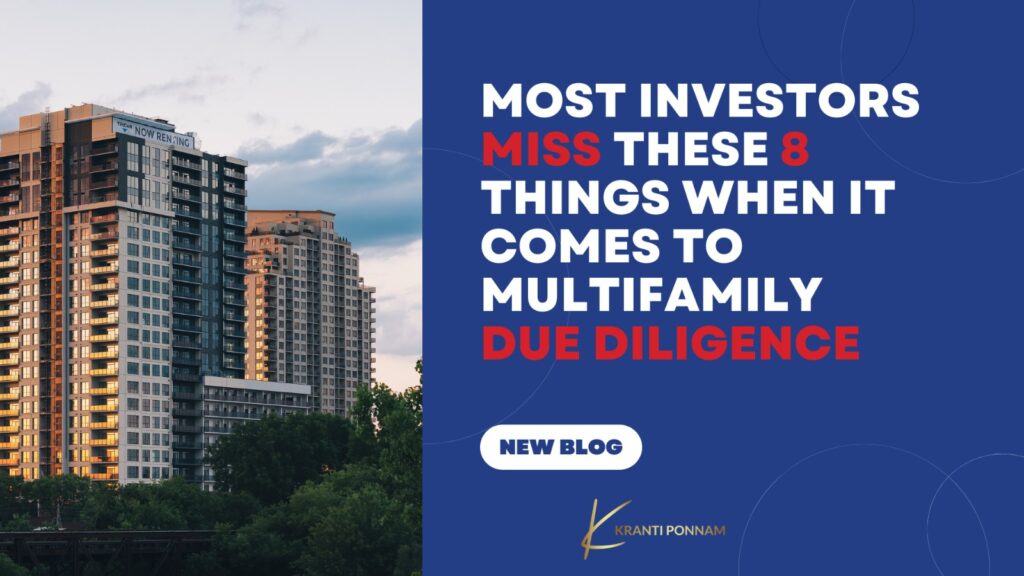Multifamily due diligence is a crucial step in any real estate investment. It involves a thorough examination and verification of the property’s physical, financial and legal aspects to ensure that there are no hidden risks or liabilities that can affect the value or performance of the asset.
However, many investors overlook some important aspects of multifamily due diligence that can make or break their deal. Here are eight things that most investors miss when it comes to multifamily due diligence and how to avoid them.
1. Aluminum Wiring
Aluminum wiring was used in many multifamily buildings and residential homes from the mid-1960s to the 1970s due to high copper prices. However, aluminum wiring can pose a fire hazard as it can overheat, corrode or loosen over time. Many lenders require investors to update aluminum wiring to copper wiring before they approve a loan. This can be an expensive and time-consuming fix that can affect your budget and timeline. Therefore, it is important to check the wiring of the property and factor in the cost of upgrading it if necessary.
2. Outlets
Another electrical issue that many investors miss is the grounding of the outlets. Before 1969, many residential units did not have a grounding in the electrical outlets, which means they only had two-pronged outlets instead of three-pronged ones. This can pose a safety risk as well as a code violation. Many lenders and inspectors will require investors to update the outlets to code, which can also add to your expenses and delays. Therefore, it is important to inspect the outlets of the property and plan for the cost of updating them if needed.
3. Federal Pacific or FPE Stab-Lok Breaker Panels
These breaker panels were installed from the 1950s to the 1980s and are potentially dangerous because they can fail to trip when there is an overload or a short circuit, which can cause fires. Many lenders and inspectors will require investors to replace these panels with safer ones before they approve a loan or a certificate of occupancy. This can also be a costly and time-consuming fix that can affect your deal. Therefore, it is important to check the breaker panels of the property and budget for the cost of replacing them if necessary.
4. HVAC Inventory
Many sellers do not have an accurate inventory of their HVAC systems, which can lead to surprises and problems for investors. HVAC systems are one of the most expensive and essential components of a multifamily property, as they affect the comfort and satisfaction of the residents as well as the energy efficiency and maintenance costs of the property. Therefore, it is important to conduct a thorough inspection and inventory of the HVAC systems of the property, including their age, condition, capacity, warranty and service history. This will help you determine the remaining useful life, repair or replacement needs and operating costs of the HVAC systems.
5. Competitive Set
Many investors do not conduct a proper analysis of the competitive set of their target property, which can affect their valuation and strategy. The competitive set consists of properties within the same submarket that have similar characteristics, such as age, size, unit mix, amenities and rent levels. The competitive set helps you understand the market demand, supply, trends and opportunities for your target property. Therefore, it is important to identify and analyze the competitive set of your target property, including their occupancy rates, rental rates, concession packages and value-add potential.
6. In-Person Property Tour
Many investors rely on online information or third-party reports to evaluate a property, but nothing beats an in-person property tour to get a firsthand impression and insight into the property’s condition and potential. An in-person property tour allows you to see things that may not be visible or disclosed online or on paper, such as deferred maintenance issues, structural problems, environmental hazards or tenant complaints. It also allows you to interact with the property manager, staff and residents to get a sense of the property’s operations, culture and reputation. Therefore, it is important to conduct an in-person property tour of your target property as well as its competitive set before you make an offer or finalize a deal.
7. Lease Audit
Many investors do not conduct a thorough lease audit of their target property, which can expose them to legal risks or financial losses. A lease audit involves reviewing every lease agreement between the landlord and the tenants to verify their accuracy, completeness and compliance with local laws and regulations. A lease audit helps you identify any discrepancies, errors or violations that may affect your income or expenses, such as rent roll inaccuracies, security deposit discrepancies, lease expiration dates, renewal options or clauses that may limit your ability to raise rents or evict tenants. Therefore, it is important to conduct a lease audit of your target property and resolve any issues before you close the deal.
8. Market Stability vs Volatility
Many investors do not consider the market stability or volatility of their target property’s location, which can affect their returns and risks. Market stability refers to the degree of consistency and predictability of the market conditions, such as population growth, job growth, income growth, vacancy rates and rent growth. Market volatility refers to the degree of variation and uncertainty of the market conditions, such as economic cycles, supply and demand shocks, natural disasters or political changes. Generally, stable markets offer lower returns but lower risks, while volatile markets offer higher returns but higher risks. Therefore, it is important to understand the market stability or volatility of your target property’s location and align your investment objectives, expectations and strategies accordingly.
Conclusion
Multifamily due diligence is a complex and comprehensive process that requires attention to detail, expertise and experience. By avoiding these eight common mistakes that most investors make, you can increase your chances of finding and acquiring a profitable multifamily property that meets your goals and criteria.
If you need help with your multifamily due diligence process, contact us today. We are a team of experienced and professional multifamily investors who can assist you with every aspect of your multifamily investment journey.




